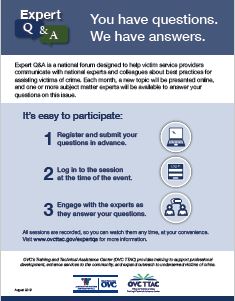Current Session
Stay tuned for information about the next Expert Q&A session!
Stay in Touch
Want to be the first to hear about new sessions? Subscribe to the Expert Q&A email list for the latest announcements.
Let Others Know About the Expert Q&A
 Download and share the flier (PDF, 407 KB).
Download and share the flier (PDF, 407 KB).






